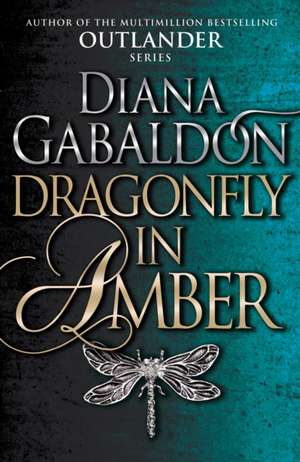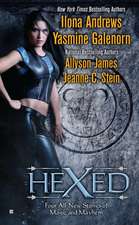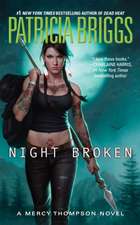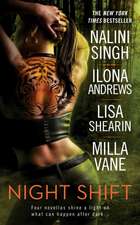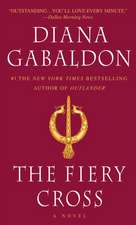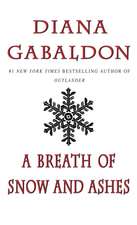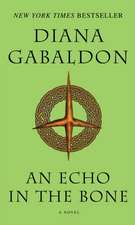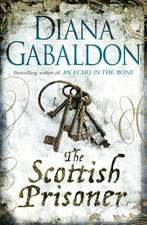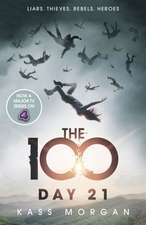Dragonfly in Amber: Outlander, cartea 2
Autor Diana Gabaldonen Limba Engleză Paperback – 19 feb 2015
But now she is returning with her grown daughter to the majesty of Scotland's mist-shrouded hills. Here Claire plans to reveal a truth as stunning as the events that gave it birth: about the mystery of an ancient circle of standing stones, about a love that transcends the boundaries of time, and about James Fraser, a warrior whose gallantry once drew the young Claire from the security of her century to the dangers of his. Now a legacy of blood and desire will test her beautiful daughter as Claire's spellbinding journey continues in the intrigue-ridden court of Charles Edward Stuart, in a race to thwart a doomed uprising, and in a desperate fight to save both the child and the man she loves.
| Toate formatele și edițiile | Preț | Express |
|---|---|---|
| Paperback (3) | 60.33 lei 3-5 săpt. | +17.75 lei 4-10 zile |
| Dell Publishing Company – 31 oct 1993 | 60.33 lei 3-5 săpt. | +17.75 lei 4-10 zile |
| Random House – 19 feb 2015 | 61.88 lei 24-35 zile | +33.72 lei 4-10 zile |
| Bantam – 31 iul 2001 | 118.38 lei 3-5 săpt. | |
| Hardback (1) | 236.03 lei 3-5 săpt. | |
| Delacorte Press – 30 iun 1992 | 236.03 lei 3-5 săpt. |
Din seria Outlander
- 16%
 Preț: 53.31 lei
Preț: 53.31 lei - 22%
 Preț: 56.11 lei
Preț: 56.11 lei - 11%
 Preț: 60.61 lei
Preț: 60.61 lei - NaN%
 Preț: 270.07 lei
Preț: 270.07 lei - 32%
 Preț: 56.55 lei
Preț: 56.55 lei - 21%
 Preț: 56.42 lei
Preț: 56.42 lei - 16%
 Preț: 63.36 lei
Preț: 63.36 lei - 25%
 Preț: 67.20 lei
Preț: 67.20 lei -
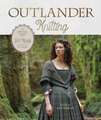 Preț: 136.20 lei
Preț: 136.20 lei -
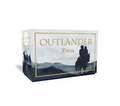 Preț: 126.43 lei
Preț: 126.43 lei - 20%
 Preț: 150.07 lei
Preț: 150.07 lei - 15%
 Preț: 247.57 lei
Preț: 247.57 lei - NaN%
 Preț: 318.76 lei
Preț: 318.76 lei - 16%
 Preț: 53.84 lei
Preț: 53.84 lei -
 Preț: 264.65 lei
Preț: 264.65 lei - 10%
 Preț: 61.15 lei
Preț: 61.15 lei - 7%
 Preț: 65.00 lei
Preț: 65.00 lei - 6%
 Preț: 60.18 lei
Preț: 60.18 lei - 7%
 Preț: 65.14 lei
Preț: 65.14 lei - 18%
 Preț: 83.45 lei
Preț: 83.45 lei -
 Preț: 125.02 lei
Preț: 125.02 lei -
 Preț: 216.93 lei
Preț: 216.93 lei
Preț: 61.88 lei
Preț vechi: 68.46 lei
-10% Nou
11.84€ • 12.36$ • 9.78£
Carte disponibilă
Livrare economică 28 martie-08 aprilie
Livrare express 08-14 martie pentru 43.71 lei
Specificații
ISBN-10: 1784751367
Pagini: 963
Dimensiuni: 128 x 198 x 48 mm
Greutate: 0.66 kg
Editura: Random House
Colecția Arrow Books
Seria Outlander
Descriere
This is the second novel in the bestselling outlander series. Now a major TV series. For twenty years Claire Randall has kept her secrets.
But now she is returning with her grown daughter to the majesty of Scotland's mist-shrouded hills. Here Claire plans to reveal a truth as stunning as the events that gave it birth: about the mystery of an ancient circle of standing stones, about a love that transcends the boundaries of time, and about James Fraser, a warrior whose gallantry once drew the young Claire from the security of her century to the dangers of his. Now a legacy of blood and desire will test her beautiful daughter as Claire's spellbinding journey continues in the intrigue-ridden court of Charles Edward Stuart, in a race to thwart a doomed uprising, and in a desperate fight to save both the child and the man she loves.
Notă biografică
Extras
Le Havre, France, 1744
Bread," I muttered feebly, keeping my eyes tightly closed. There was no response from the large, warm object next to me, other than the faint sigh of his breathing.
"Bread!" I said, a little louder. There was a sudden startled heave of the bedclothes, and I grasped the edge of the mattress and tightened all my muscles, hoping to stabilize the pitch and yaw of my internal organs.
Fumbling noises came from the far side of the bed, followed by the sliding of a drawer, a muffled exclamation in Gaelic, the soft thud of a bare foot stamping planks, and then the sinking of the mattress under the weight of a heavy body.
"Here, Sassenach," said an anxious voice, and I felt the touch of a dry bread crust against my lower lip. Groping blindly without opening my eyes, I grasped it and began to chew gingerly, forcing each choking bite down a parched throat. I knew better than to ask for water.
The dessicated wads of bread crumbs gradually made their way down my throat and took up residence in my stomach, where they lay like small heaps of ballast. The nauseating roll of my inner waves slowly calmed, and at last my innards lay at anchor. I opened my eyes, to see the anxious face of Jamie Fraser hovering a few inches above me.
"Ak!" I said, startled.
"All right, then?" he asked. When I nodded and feebly began to sit up, he put an arm around my back to help me.
Sitting down beside me on the rough inn bed, he pulled me gently against him and stroked my sleep-tousled hair.
"Poor love," he said. "Would a bit of wine help? There’s a flask of hock in my saddlebag."
"No. No, thank you." I shuddered briefly at the thought of drinking hock—I seemed to smell the dark, fruity fumes, just at the mention of it—and pushed myself upright.
"I’ll be fine in a moment," I said, with forced cheerfulness. "Don’t worry, it’s quite normal for pregnant women to feel sick in the morning."
With a dubious look at me, Jamie rose and went to retrieve his clothes from the stool near the window. France in February is cold as hell frozen over, and the bubbled-glass panes of the window were coated thick with frost.
He was naked, and a ripple of gooseflesh brushed his shoulders and raised the red-gold hairs on his arms and legs. Accustomed to cold, though, he neither shivered nor hurried as he pulled on stockings and shirt. Pausing in his
dressing, he came back to the bed and hugged me briefly.
"Go back to bed," he suggested. "I’ll send up the chambermaid to light the fire. Perhaps ye can rest a bit, now you’ve eaten. You won’t be sick now?" I wasn’t entirely sure, but nodded reassuringly.
"I don’t think so." I cast an eye back at the bed; the quilts, like most coverings supplied by public inns, were none too clean. Still, the silver in Jamie’s purse had procured us the best room in the inn, and the narrow bed was stuffed with goose feathers rather than with chaff or wool.
"Um, perhaps I will just lie down a moment," I murmured, pulling my feet off the freezing floor and thrusting them under the quilts, in search of the last remnants of warmth. My stomach seemed to have settled sufficiently to risk a sip of water, and I poured a cupful from the cracked bedroom ewer.
"What were you stamping on?" I asked, sipping carefully. "There aren’t spiders up here, are there?"
Fastening his kilt about his waist, Jamie shook his head.
"Och, no," he said. Hands busy, he tilted his head toward the table. "Just a rat. After the bread, I expect."
Glancing down, I saw the limp gray form on the floor, a small pearl of blood glistening on the snout. I made it out of bed just in time.
"It’s all right," I said faintly, a bit later. "There isn’t anything left to throw up."
"Rinse your mouth, Sassenach, but don’t swallow, for God’s sake." Jamie held the cup for me, wiped my mouth with a cloth as though I were a small and messy child, then lifted me and laid me carefully back in the bed. He frowned worriedly down at me.
"Perhaps I’d better stay here," he said. "I could send word."
"No, no, I’m all right," I said. And I was. Fight as I would to keep from vomiting in the mornings, I could hold nothing down for long. Yet once the bout was over, I felt entirely restored. Aside from a sour taste in my mouth, and a slight soreness in the abdominal muscles, I felt quite my normal self. I threw back the covers and stood up, to demonstrate.
"See? I’ll be fine. And you have to go; it wouldn’t do to keep your cousin waiting, after all."
I was beginning to feel cheerful again, despite the chilly air rushing under the door and beneath the folds of my nightgown. Jamie was still hesitating, reluctant to leave me, and I went to him and hugged him tightly, both in reassurance and because he was delightfully warm.
"Brrr," I said. "How on earth can you be warm as toast, dressed in nothing but a kilt?"
"I’ve a shirt on as well," he protested, smiling down at me.
We clung together for a bit, enjoying each other’s warmth in the quiet cold of the early French morning. In the corridor, the clash and shuffle of the chambermaid with her scuttle of kindling grew nearer.
Jamie shifted a bit, pressing against me. Because of the difficulties of traveling in the winter, we had been nearly a week on the road from Ste. Anne to Le Havre. And between the late arrivals at dismal inns, wet, filthy, and shivering with fatigue and cold, and the increasingly unsettled wakenings as my morning sickness got worse, we had scarcely touched each other since our last night at the Abbey.
"Come to bed with me?" I invited, softly.
He hesitated. The strength of his desire was obvious through the fabric of his kilt, and his hands were warm on the cool flesh of my own, but he didn’t move to take me in his arms.
"Well . . ." he said doubtfully.
"You want to, don’t you?" I said, sliding a chilly hand under his kilt to make sure.
"Oh! er . . . aye. Aye, I do." The evidence at hand bore out this statement. He groaned faintly as I cupped my hand between his legs. "Oh, Lord. Don’t do that, Sassenach; I canna keep my hands from ye."
He did hug me then, wrapping long arms about me and pulling my face into the snowy tucks of his shirt, smelling faintly of the laundry starch Brother Alfonse used at the Abbey.
"Why should you?" I said, muffled in his linen. "You’ve a bit of time to spare, surely? It’s only a short ride to the docks."
"It isna that," he said, smoothing my riotous hair.
"Oh, I’m too fat?" In fact, my stomach was still nearly flat, and I was thinner than usual because of the sickness. "Or is it . . . ?"
"No," he said, smiling. "Ye talk too much." He bent and kissed me, then scooped me up and sat down on the bed, holding me on his lap. I lay down and pulled him determinedly down on top of me.
"Claire, no!" he protested as I started unbuckling his kilt.
I stared at him. "Whyever not?"
"Well," he said awkwardly, blushing a bit. "The child . . . I mean, I dinna want to hurt it."
I laughed.
"Jamie, you can’t hurt it. It’s no bigger than the tip of my finger yet." I held up a finger in illustration, then used it to trace the full, curving line of his lower lip. He seized my hand and bent to kiss me abruptly, as though to erase the tickle of my touch.
"You’re sure?" he asked. "I mean. . . I keep thinking he wouldna like being jounced about . . ."
"He’ll never notice," I assured him, hands once more busy with the buckle of his kilt.
"Well . . . if you’re sure of it."
There was a peremptory rap at the door, and with impeccable Gallic timing, the chambermaid pushed her way in backward, carelessly gouging the door with a billet of wood as she turned. From the scarred surfaces of door and jamb, it appeared that this was her usual method of operations.
"Bonjour, Monsieur, Madame," she muttered, with a curt nod toward the bed as she shuffled toward the hearth. All right for some people, said her attitude, louder than words. Used by this time to the matter-of-factness with which servants treated the sight of inn patrons in any form of dishabille, I merely murmured "Bonjour, Mademoiselle," in return and let it go at that. I also let go of Jamie’s kilt, and slid under the covers, pulling the quilt up to hide my scarlet cheeks.
Possessed of somewhat greater sang-froid, Jamie placed one of the bolsters strategically across his lap, parked his elbows on it, rested his chin on upturned palms, and made pleasant conversation with the maid, praising the cuisine of the house.
"And from where do you procure the wine, Mademoiselle?" he asked politely.
"From here, from there." She shrugged, stuffing kindling rapidly under the sticks with a practiced hand. "Wherever it’s cheapest." The woman’s plump face creased slightly as she gave Jamie a sidelong look from the hearth.
"I gathered as much," he said, grinning at her, and she gave a brief snort of amusement.
"I’ll wager I can match the price you’re getting, and double the quality," he offered. "Tell your mistress."
One eyebrow rose skeptically. "And what’s your own price, Monsieur?"
He made an altogether Gallic gesture of self-abnegation. "Nothing, Mademoiselle. I go to call upon a kinsman who sells wine. Perhaps I can bring him some new business to ensure my welcome, no?"
She nodded, seeing the wisdom of this, and grunted as she rose from her knees.
"Well enough, Monsieur. I’ll speak to the patronne."
The door thumped to behind the maid, aided by a skillful swing of her hip in passing. Putting the bolster aside, Jamie stood up and began to rebuckle his kilt.
"Where do you think you’re going?" I protested.
He glanced down at me, and a reluctant smile curved the wide mouth.
"Oh. Well . . . you’re sure you’re up to it, Sassenach?"
"I am if you are," I said, unable to resist.
He eyed me austerely.
"Just for that, I should go at once," he said. "Still, I’ve heard that ye ought to humor expectant mothers." He let the kilt fall to the floor and sat down beside me in his shirt, the bed creaking beneath his weight.
His breath rose in a faint cloud as he turned back the quilt and spread the front of the nightdress to expose my breasts. Bending his head, he kissed each one, touching the nipple delicately with his tongue, so it rose as though by magic, a swelling dark pink against the white skin of my breast.
"God, they’re so lovely," he murmured, repeating the process on the other side. He cupped both breasts, admiring them.
"They’re heavier," he said, "just a bit. And the nipples are darker, too." One forefinger traced the springing curve of a single fine hair that rose near the dark areola, silver in the frosted light of the morning.
Lifting the quilt, he rolled next to me and I turned into his arms, clasping the solid curves of his back, letting my hands cup the firm rounds of his buttocks. His bare flesh was chilled by the morning air, but the goose bumps smoothed away under the warmth of my touch.
I tried to bring him to me at once, but he resisted me gently, forcing me down onto the pillow as he nibbled the edges of neck and ear. One hand slid up my thigh, the thin material of the nightgown gliding in waves before it.
His head dipped lower, and his hands gently spread my thighs apart. I shivered momentarily as the cold air hit the bare skin of my legs, then relaxed completely into the warm demand of his mouth.
His hair was loose, not yet laced back for the day, and the soft red tickle of it brushed my thighs. The solid weight of his body rested comfortably between my legs, broad hands cupped on the roundness of my hips.
"Mmmm?" came an interrogative sound from below.
I arched my hips slightly in response, and a brief chuckle grazed my skin with warmth.
The hands slid beneath my hips and raised me, and I relaxed into deliquescence as the tiny shudder grew and spread, rising in seconds to a fulfillment that left me limp and gasping, Jamie’s head resting on my thigh. He waited a moment for me to recover, caressing the slope of my leg, before returning to his self-appointed task.
I smoothed the tumbled hair back, caressing those ears, so incongruously small and neat for such a large, blunt man. The upper curve glowed with a faint, translucent pink, and I ran my thumb along the edge of the curve.
"They’re pointed at the tips," I said. "Just a bit. Like a faun’s."
"Oh, aye?" he said, interrupting his labors for a moment. "Like a small deer, ye mean, or the things ye see in classical paintings wi’ goat’s legs, chasing naked women?"
I lifted my head and peered down across the roil of bedclothes, nightgown, and naked flesh, to the deep blue cat-eyes, gleaming above damp curls of brown hair.
"If the shoe fits," I said, "wear it." And let my head fall back on the pillow as the resultant muffled laugh vibrated against my all too sensitive flesh.
"Oh," I said, straining upward. "Oh, my. Jamie, come here."
"Not yet," he said, doing something with the tip of his tongue that made me squirm uncontrollably.
"Now," I said.
He didn’t bother to reply, and I had no more breath to speak with.
"Oh," I said, a bit later. "That’s . . ."
"Mmmm?"
"Good," I murmured. "Come here."
"No, I’ll do," he said, face invisible behind the tangle of roan and cinnamon. "Would ye like it if I . . ."
"Jamie," I said. "I want you. Come here."
Sighing in resignation, he rose to his knees and let me pull him upward, settling at last with his weight balanced on his elbows, but comfortingly solid on top of me, belly to belly and lips to lips. He opened his mouth to protest further, but I promptly kissed him, and he slid between my thighs before he could stop himself. He moaned slightly in involuntary pleasure as he entered me, muscles tensing as he gripped my shoulders.
He was gentle and slow, pausing now and then to kiss me deeply, moving again only at my silent urging. I ran my hands softly down the slope of his back, careful not to press on the healing ridges of the fresh scars. The long muscles of his thigh trembled briefly against my own, but he held back, unwilling to move as quickly as he needed to.
I moved my hips against him, to bring him deeper.
He closed his eyes, and his brow furrowed slightly in concentration. His mouth was open, and his breath came hard.
"I can’t . . ." he said. "Oh, God, I canna help it." His buttocks clenched suddenly, taut beneath my hands.
I sighed with deep satisfaction, and pulled him hard against me.
"You’re all right?" he asked, a few moments later.
"I won’t break, you know," I said, smiling into his eyes.
He laughed huskily. "Maybe not, Sassenach, but I may." He gathered me close against him, his cheek pressed against my hair.
I flipped the quilt up and tucked it around his shoulders, sealing us in a pocket of warmth. The heat of the fire had not yet reached the bed, but the ice on the window was thawing, the crusted edge of the rime melted into glowing diamonds.
We lay quiet for a time, listening to the occasional crack of the burning applewood in the hearth and the faint sounds of the inn as the guests stirred to life. There were callings to and fro from the balconies across the courtyard, the swish and clop of hooves on the slushy stones outside, and the odd squeal now and then from below, from the piglets the landlady was raising in the kitchen behind the stove.
"Très français, n’est-ce pas?" I said, smiling at the sounds of an altercation drifting up through the floorboards, an amiable settling of accounts between the innkeeper’s wife and the local vintner.
"Diseased son of a pox-ridden whore," the female voice remarked. "The brandy from last week tasted like horse-piss."
I didn’t need to see the reply to imagine the one-shouldered shrug that went with it.
"How would you know, Madame? After the sixth glass, it all tastes the same, is it not so?"
The bed shook slightly as Jamie laughed with me. He lifted his head from the pillow and sniffed appreciatively at the scent of frying ham that filtered through the drafty chinks of the floorboards.
"Aye, it’s France," he agreed. "Food, and drink—and love." He patted my bare hip before tugging the wrinkled gown down over it.
"Jamie," I said softly, "are you happy about it? About the baby?" Outlawed in Scotland, barred from his own home, and with only vague prospects in France, he could pardonably have been less than enthused about acquiring an additional obligation.
He was silent for a moment, only hugging me harder, then sighed briefly before answering.
"Aye, Sassenach." His hand strayed downward, gently rubbing my belly. "I’m happy. And proud as a stallion. But I am most awfully afraid, too."
"About the birth? I’ll be all right." I could hardly blame him for apprehension; his own mother had died in childbirth, and birth and its complications were the leading cause of death for women in these times. Still, I knew a thing or two myself, and I had no intention whatever of exposing myself to what passed for medical care here.
"Aye, that—and everything," he said softly. "I want to protect ye, Sassenach—spread myself over ye like a cloak and shield you and the child wi’ my
body." His voice was soft and husky, with a slight catch in it. "I would do anything for ye . . . and yet . . . there’s nothing I can do. It doesna matter how strong I am, or how willing; I canna go with you where ye must go . . . nor even help ye at all. And to think of the things that might happen, and me helpless to stop them . . . aye, I’m afraid, Sassenach.
"And yet"—he turned me toward him, hand closing gently over one breast—"yet when I think of you wi’ my child at your breast . . . then I feel as though I’ve gone hollow as a soap bubble, and perhaps I shall burst with joy."
He pressed me tight against his chest, and I hugged him with all my might.
"Oh, Claire, ye do break my heart wi’ loving you."
* * *
I slept for some time, and woke slowly, hearing the clang of a church bell ringing in the nearby square. Fresh from the Abbey of Ste. Anne, where all the day’s activities took place to the rhythm of bells, I automatically glanced at the window, to gauge the intensity of the light and guess the time of day. Bright, clear light, and a window free of ice. The bells rang for the Angelus then, and it was noon.
I stretched, enjoying the blissful knowledge that I needn’t get up at once. Early pregnancy made me tired, and the strain of travel had added to my fatigue, making the long rest doubly welcome.
It had rained and snowed unceasingly on the journey as the winter storms battered the French coast. Still, it could have been worse. We had originally intended to go to Rome, not Le Havre. That would have been three or four weeks’ travel, in this weather.
Faced with the prospect of earning a living abroad, Jamie had obtained a recommendation as a translator to James Francis Edward Stuart, exiled King of Scotland—or merely the Chevalier St. George, Pretender to the Throne, depending on your loyalties—and we had determined to join the Pretender’s court near Rome.
It had been a near thing, at that; we had been on the point of leaving for Italy, when Jamie’s uncle Alexander, Abbot of Ste. Anne’s, had summoned us to his study.
"I have heard from His Majesty," he announced without preamble.
"Which one?" Jamie asked. The slight family resemblance between the two men was exaggerated by their posture—both sat bolt upright in their chairs, shoulders squared. On the abbot’s part, the posture was due to natural asceticism; on Jamie’s, to reluctance to let the newly healed scars on his back contact the wood of the chair.
"His Majesty King James," his uncle replied, frowning slightly at me. I was careful to keep my face blank; my presence in Abbot Alexander’s study was a mark of trust, and I didn’t want to do anything to jeopardize it. He had known me a bare six weeks, since the day after Christmas, when I had appeared at his gate with Jamie, who was near death from torture and imprisonment. Subsequent acquaintance had presumably given the abbot some confidence in me. On the other hand, I was still English. And the English King’s name was George, not James.
"Aye? Is he not in need of a translator, then?" Jamie was still thin, but he had been working outdoors with the Brothers who minded the stables and fields of the Abbey, and his face was regaining tinges of its normal healthy color.
"He is in need of a loyal servant—and a friend." Abbot Alexander tapped his fingers on a folded letter that lay on his desk, the crested seal broken. He pursed his lips, glancing from me to his nephew and back.
"What I tell you now must not be repeated," he said sternly. "It will be common knowledge soon, but for now—" I had tried to look trustworthy and close-mouthed; Jamie merely nodded, with a touch of impatience.
"His Highness, Prince Charles Edward, has left Rome, and will arrive in France within the week," the Abbot said, leaning slightly forward as though to emphasize the importance of what he was saying.
And it was important. James Stuart had mounted an abortive attempt to regain his throne in 1715—an ill-considered military operation that had failed almost immediately for lack of support.
Since then—according to Alexander—the exiled James of Scotland had worked tirelessly, writing ceaselessly to his fellow monarchs, and particularly to his cousin, Louis of France, reiterating the legitimacy of his claim to the throne of Scotland and England, and the position of his son, Prince Charles, as heir to that throne.
"His royal cousin Louis has been distressingly deaf to these entirely proper claims," the Abbot had said, frowning at the letter as though it were Louis. "If he’s now come to a realization of his responsibilities in the matter, it’s cause for great rejoicing among those who hold dear the sacred right of kingship."
Among the Jacobites, that was, James’s supporters. Of whom Abbot Alexander of the Abbey of Ste. Anne—born Alexander Fraser of Scotland—was one. Jamie had told me that Alexander was one of the exiled King’s most frequent correspondents, in touch with all that touched the Stuart cause.
"He’s well placed for it," Jamie had explained to me, discussing the endeavor on which we were about to embark. "The papal messenger system crosses Italy, France, and Spain faster than almost any other. And the papal messengers canna be interfered with by government customs officers, so the letters they carry are less likely to be intercepted."
James of Scotland, exiled in Rome, was supported in large part by the Pope, in whose interest it very much was to have a Catholic monarchy restored to England and Scotland. Therefore, the largest part of James’s private mail was carried by papal messenger—and passed through the hands of loyal supporters within the Church hierarchy, like Abbot Alexander of Ste. Anne de Beaupré, who could be depended on to communicate with the King’s supporters in Scotland, with less risk than sending letters openly from Rome to Edinburgh and the Highlands.
I watched Alexander with interest, as he expounded the importance of Prince Charles’s visit to France. A stocky man of about my own height, he was dark, and considerably shorter than his nephew, but shared with him the faintly slanted eyes, the sharp intelligence, and the talent for discerning hidden motive that seemed to characterize the Frasers I had met.
"So," he finished, stroking his full, dark-brown beard, "I cannot say whether His Highness is in France at Louis’s invitation, or has come uninvited, on behalf of his father."
"It makes a wee bit of difference," Jamie remarked, raising one eyebrow skeptically.
His uncle nodded, and a wry smile showed briefly in the thicket of his beard.
"True, lad," he said, letting a faint hint of his native Scots emerge from his usual formal English. "Very true. And that’s where you and your wife may be of service, if ye will."
The proposal was simple; His Majesty King James would provide travel expenses and a small stipend, if the nephew of his most loyal and most esteemed friend Alexander would agree to travel to Paris, there to assist his son, His Highness Prince Charles Edward, in whatever ways the latter might require.
I was stunned. We had meant originally to go to Rome because that seemed the best place to embark on our quest: the prevention of the second Jacobite Rising—the ’45. From my own knowledge of history, I knew that the Rising, financed from France and carried out by Charles Edward Stuart, would go much farther than had his father’s attempt in 1715—but not nearly far enough. If matters progressed as I thought they would, then the troops under Bonnie Prince Charlie would meet with disastrous defeat at Culloden in 1746, and the people of the Highlands would suffer the repercussions of defeat for two centuries thereafter.
Now, in 1744, apparently Charles himself was just beginning his search for support in France. Where better to try to stop a rebellion, than at the side of its leader?
I glanced at Jamie, who was looking over his uncle’s shoulder at a small shrine set into the wall. His eyes rested on the gilded figure of Ste. Anne herself and the small sheaf of hothouse flowers laid at her feet, while his thoughts worked behind an expressionless face. At last he blinked once, and smiled at his uncle.
"Whatever assistance His Highness might require? Aye," he said quietly, "I think I can do that. We’ll go."
And we had. Instead of proceeding directly to Paris, though, we had come down the coast from Ste. Anne to Le Havre, to meet first with Jamie’s cousin, Jared Fraser.
A prosperous Scottish émigré, Jared was an importer of wines and spirits, with a small warehouse and large town house in Paris, and a very large warehouse indeed here in Le Havre, where he had asked Jamie to meet him, when Jamie had written to say we were en route to Paris.
Sufficiently rested by now, I was beginning to feel hungry. There was food on the table; Jamie must have told the chambermaid to bring it while I slept.
I had no dressing gown, but my heavy velvet traveling cloak was handy; I sat up and pulled the warm weight of it over my shoulders before rising to relieve myself, add another stick of wood to the fire, and sit down to my late breakfast.
I chewed hard rolls and baked ham contentedly, washing them down with the jug of milk provided. I hoped Jamie was being adequately fed as well; he insisted that Jared was a good friend, but I had my doubts about the hospitality of some of Jamie’s relatives, having met a few of them by now. True, Abbot Alexander had welcomed us—insofar as a man in the abbot’s position could be said to welcome having an outlaw nephew with a suspect wife descend upon him unexpectedly. But our sojourn with Jamie’s mother’s people, the MacKenzies of Leoch, had come within inches of killing me the autumn before, when I had been arrested and tried as a witch.
"Granted," I’d said, "this Jared’s a Fraser, and they seem a trifle safer than your MacKenzie relatives. But have you actually met him before?"
"I lived with him for a time when I was eighteen," he told me, dribbling candle-wax onto his reply and pressing his father’s wedding ring on the resultant greenish-gray puddle. A small cabochon ruby, its mount was engraved with the Fraser clan motto, je suis prest: "I am ready."
"He had me to stay with him when I came to Paris to finish my schooling, and learn a bit of the world. He was verra kind to me; a good friend of my father’s. And there’s no one knows more about Parisian society than the man who sells it drink," he added, cracking the ring loose from the hardened wax. "I want to talk to Jared before I walk into Louis’s court by the side of Charles Stuart; I should like to feel that I have some chance of getting out again," he finished wryly.
"Why? Do you think there’ll be trouble?" I asked. "Whatever assistance His Highness might require" seemed to offer quite a bit of latitude.
He smiled at my worried look.
"No, I dinna expect any difficulty. But what is it the Bible says, Sassenach? ‘Put not your trust in princes’?" He rose and kissed me quickly on the brow, tucking the ring back in his sporran. "Who am I to ignore the word of God, eh?"
* * *
I spent the afternoon in reading one of the herbals that my friend Brother Ambrose had pressed upon me as a parting gift, then in necessary repairs with needle and thread. Neither of us owned many clothes, and while there were advantages in traveling light, it meant that holey socks and undone hems demanded immediate attention. My needlecase was nearly as precious to me as the small chest in which I carried herbs and medicines.
The needle dipped in and out of the fabric, winking in the light from the window. I wondered how Jamie’s visit with Jared was going. I wondered still more what Prince Charles would be like. He would be the first historically famous person I had met, and while I knew better than to believe all the legends that had (not had, would, I reminded myself) sprung up around him, the reality of the man was a mystery. The Rising of the ’45 would depend almost entirely on the personality of this one young man—its failure or success. Whether it took place at all might depend upon the efforts of another young man—Jamie Fraser. And me.
I was still absorbed in my mending and my thoughts, when heavy footsteps in the corridor aroused me to the realization that it was late in the day; the drip of water from the eaves had slowed as the temperature dropped, and the flames of the sinking sun glowed in the ice spears hanging from the roof. The door opened, and Jamie came in.
He smiled vaguely in my direction, then stopped dead by the table, face absorbed as though he were trying to remember something. He took his cloak off, folded it, and hung it neatly over the foot of the bed, straightened, marched over to the other stool, sat down on it with great precision, and closed his eyes.
I sat still, my mending forgotten in my lap, watching this performance with considerable interest. After a moment, he opened his eyes and smiled at me, but didn’t say anything. He leaned forward, studying my face with great attention, as though he hadn’t seen me in weeks. At last, an expression of profound revelation passed over his face, and he relaxed, shoulders slumping as he rested his elbows on his knees.
"Whisky," he said, with immense satisfaction.
"I see," I said cautiously. "A lot of it?"
He shook his head slowly from side to side, as though it were very heavy. I could almost hear the contents sloshing.
"Not me," he said, very distinctly. "You."
"Me?" I said indignantly.
"Your eyes," he said. He smiled beatifically. His own eyes were soft and dreamy, cloudy as a trout pool in the rain.
"My eyes? What have my eyes got to do with . . ."
"They’re the color of verra fine whisky, wi’ the sun shining through them from behind. I thought this morning they looked like sherry, but I was wrong. Not sherry. Not brandy. It’s whisky. That’s what it is." He looked so gratified as he said this that I couldn’t help laughing.
"Jamie, you’re terribly drunk. What have you been doing?"
His expression altered to a slight frown.
"I’m not drunk."
"Oh, no?" I laid the mending aside and came over to lay a hand on his forehead. It was cool and damp, though his face was flushed. He at once put his arms about my waist and pulled me close, nuzzling affectionately at my bosom. The smell of mingled spirits rose from him like a fog, so thick as almost to be visible.
"Come here to me, Sassenach," he murmured. "My whisky-eyed lass, my love. Let me take ye to bed."
I thought it a debatable point as to who was likely to be taking whom to bed, but didn’t argue. It didn’t matter why he thought he was going to bed, after all, provided he got there. I bent and got a shoulder under his armpit to help him up, but he leaned away, rising slowly and majestically under his own power.
"I dinna need help," he said, reaching for the cord at the neck of his shirt. "I told ye, I’m not drunk."
"You’re right," I said. " ‘Drunk’ isn’t anywhere near sufficient to describe your current state. Jamie, you’re completely pissed." His eyes traveled down the front of his kilt, across the floor, and up the front of my gown.
"No, I’m not," he said, with great dignity. "I did that outside." He took a step toward me, glowing with ardor. "Come here to me, Sassenach; I’m ready."
I thought "ready" was a bit of an overstatement in one regard; he’d gotten his buttons half undone, and his shirt hung askew on his shoulders, but that was as far as he was likely to make it unaided.
In other respects, though . . . the broad expanse of his chest was exposed, showing the small hollow in the center where I was accustomed to rest my chin, and the small curly hairs sprang up joyous around his nipples. He saw me looking at him, and reached for one of my hands, clasping it to his breast. He was startlingly warm, and I moved instinctively toward him. The other arm swept round me and he bent to kiss me. He made such a thorough job of it that I felt mildly intoxicated, merely from sharing his breath.
"All right," I said, laughing. "If you’re ready, so am I. Let me undress you first, though—I’ve had enough mending today."
He stood still as I stripped him, scarcely moving. He didn’t move, either, as I attended to my own clothes and turned down the bed.
I climbed in and turned to look at him, ruddy and magnificent in the sunset glow. He was finely made as a Greek statue, long-nosed and high-cheeked as a profile on a Roman coin. The wide, soft mouth was set in a dreamy smile, and the slanted eyes looked far away. He was perfectly immobile.
I viewed him with some concern.
"Jamie," I said, "how, exactly, do you decide whether you’re drunk?"
Aroused by my voice, he swayed alarmingly to one side, but caught himself on the edge of the mantelpiece. His eyes drifted around the room, then fixed on my face. For an instant, they blazed clear and pellucid with intelligence.
"Och, easy, Sassenach. If ye can stand up, you’re not drunk." He let go of the mantelpiece, took a step toward me, and crumpled slowly onto the hearth, eyes blank, and a wide, sweet smile on his dreaming face.
"Oh," I said.
* * *
The yodeling of roosters outside and the clashing of pots below woke me just after dawn the next morning. The figure next to me jerked, waking abruptly, then froze as the sudden movement jarred his head.
I raised up on one elbow to examine the remains. Not too bad, I thought critically. His eyes were screwed tightly shut against stray beams of sunlight, and his hair stuck out in all directions like a hedgehog’s spines, but his skin was pale and clear, and the hands clutching the coverlet were steady.
I pried up one eyelid, peered within, and said playfully, "Anybody home?"
The twin to the eye I was looking at opened slowly, to add its baleful glare to the first. I dropped my hand and smiled charmingly at him.
"Good morning."
"That, Sassenach, is entirely a matter of opinion," he said, and closed both eyes again.
"Have you got any idea how much you weigh?" I asked conversationally.
"No."
The abruptness of the reply suggested that he not only didn’t know, he didn’t care, but I persisted in my efforts.
"Something around fifteen stone, I make it. About as much as a good-sized boar. Unfortunately, I didn’t have any beaters to hang you upside down from a spear and carry you home to the smoking shed."
One eye opened again, and looked consideringly at me, then at the hearthstone on the far side of the room. One corner of his mouth lifted in a reluctant smile.
"How did you get me in bed?"
"I didn’t. I couldn’t budge you, so I just laid a quilt over you and left you on the hearth. You came to life and crawled in under your own power, somewhere in the middle of the night."
He seemed surprised, and opened the other eye again.
"I did?"
I nodded and tried to smooth down the hair that spiked out over his left ear.
"Oh, yes. Very single-minded, you were."
"Single-minded?" He frowned, thinking, and stretched, thrusting his arms up over his head. Then he looked startled.
"No. I couldn’t have."
"Yes, you could. Twice."
He squinted down his chest, as though looking for confirmation of this improbable statement, then looked back at me.
"Really? Well, that’s hardly fair; I dinna remember a thing about it." He hesitated for a moment, looking shy. "Was it all right, then? I didna do anything foolish?"
I flopped down next to him and snuggled my head into the curve of his shoulder.
"No, I wouldn’t call it foolish. You weren’t very conversational, though."
"Thank the Lord for small blessings," he said, and a small chuckle rumbled through his chest.
"Mm. You’d forgotten how to say anything except ‘I love you,’ but you said that a lot."
The chuckle came back, louder this time. "Oh, aye? Well, could have been worse, I suppose."
He drew in his breath, then paused. He turned his head and sniffed suspiciously at the soft tuft of cinnamon under his raised arm.
"Christ!" he said. He tried to push me away. "Ye dinna want to put your head near my oxter, Sassenach. I smell like a boar that’s been dead a week."
"And pickled in brandy after," I agreed, snuggling closer. "How on earth did you get so—ahem—stinking drunk, anyway?"
"Jared’s hospitality." He settled himself in the pillows with a deep sigh, arm round my shoulder.
"He took me down to show me his warehouse at the docks. And the storeroom there where he keeps the rare vintages and the Portuguese brandy and the Jamaican rum." He grimaced slightly, recalling. "The wine wasna so bad, for that you just taste, and spit it on the floor when you’ve done wi’ a mouthful. But neither of us could see wasting the brandy that way. Besides, Jared said ye need to let it trickle down the back of your throat, to appreciate it fully."
"How much of it did you appreciate?" I asked curiously.
"I lost count in the middle of the second bottle." Just then, a church bel started to ring nearby; the summons to early Mass. Jamie sat bolt upright, staring at the windowpane, bright with sun.
"Christ, Sassenach! What time is it?"
"About six, I suppose," I said, puzzled. "Why?"
He relaxed slightly, though he stayed sitting up.
"Oh, that’s all right, then. I was afraid it was the Angelus bell. I’d lost all track of time."
"I’d say so. Does it matter?"
In a burst of energy, he threw back the quilts and stood up. He staggered a moment, but kept his balance, though both hands went to his head, to make sure it was still attached.
"Aye," he said, gasping a bit. "We’ve an appointment this morning down at the docks, at Jared’s warehouse. The two of us."
"Really?" I clambered out of bed myself, and groped for the chamber pot under the bed. "If he’s planning to finish the job, I shouldn’t think he’d want witnesses."
Jamie’s head popped through the neck of his shirt, eyebrows raised.
"Finish the job?"
"Well, most of your other relatives seem to want to kill you or me; why not Jared? He’s made a good start at poisoning you, seems to me."
"Verra funny, Sassenach," he said dryly. "Have ye something decent to wear?"
I had been wearing a serviceable gray serge gown on our travels, acquired through the good offices of the almoner at the Abbey of Ste. Anne, but I did also have the gown in which I had escaped from Scotland, a gift from Lady Annabelle MacRannoch. A pretty leaf-green velvet, it made me look rather pale, but was stylish enough.
"I think so, if there aren’t too many saltwater stains on it."
I knelt by the small traveling chest, unfolding the green velvet. Kneeling next to me, Jamie flipped back the lid of my medicine box, studying the layers of bottles and boxes and bits of gauze-wrapped herbs.
"Have ye got anything in here for a verra vicious headache, Sassenach?"
I peered over his shoulder, then reached in and touched one bottle.
"Horehound might help, though it’s not the best. And willow-bark tea with sow fennel works fairly well, but it takes some time to brew. Tell you what—why don’t I make you up a recipe for hobnailed liver? Wonderful hangover cure."
He bent a suspicious blue eye on me.
"That sounds nasty."
"It is," I said cheerfully. "But you’ll feel lots better after you throw up."
"Mphm." He stood up and nudged the chamber pot toward me with one toe.
"Vomiting in the morning is your job, Sassenach," he said. "Get it over with and get dressed. I’ll stand the headache."
* * *
Jared Munro Fraser was a small, spare, black-eyed man, who bore more than a passing resemblance to his distant cousin Murtagh, the Fraser clansman who had accompanied us to Le Havre. When I first saw Jared, standing majestically in the gaping doors of his warehouse, so that streams of longshoremen carrying casks were forced to go around him, the resemblance was strong enough that I blinked and rubbed my eyes. Murtagh, so far as I knew, was still at the inn, attending a lame horse.
Jared had the same lank, dark hair and piercing eyes; the same sinewy, monkey-like frame. But there all resemblance stopped, and as we drew closer, Jamie gallantly clearing a path for me through the mob with elbows and shoulders, I could see the differences as well. Jared’s face was oblong, rather than hatchet-shaped, with a cheerful snub nose that effectively ruined the dignified air conferred at a distance by his excellent tailoring and upright carriage.
A successful merchant rather than a cattle-raider, he also knew how to smile—unlike Murtagh, whose natural expression was one of unrelieved dourness—and a broad grin of welcome broke out on his face as we were jostled and shoved up the ramp into his presence.
"My dear!" he exclaimed, clutching me by the arm and yanking me deftly out of the way of two burly stevedores rolling a gigantic cask through the huge door. "So pleased to see you at last!" The cask bumped noisily on the boards of the ramp, and I could hear the rolling slosh of its contents as it passed me.
"You can treat rum like that," Jared observed, watching the ungainly progress of the enormous barrel through the obstructions of the warehouse, "but not port. I always fetch that up myself, along with the bottled wines. In fact, I was just setting off to see to a new shipment of Belle Rouge port. Would you perhaps be interested in accompanying me?"
I glanced at Jamie, who nodded, and we set off at once in Jared’s wake, sidestepping the rumbling traffic of casks and hogsheads, carts and barrows, and men and boys of all descriptions carrying bolts of fabric, boxes of grain and foodstuffs, rolls of hammered copper, sacks of flour, and anything else that could be transported by ship.
Le Havre was an important center of shipping traffic, and the docks were the heart of the city. A long, solid wharf ran nearly a quarter-mile round the edge of the harbor, with smaller docks protruding from it, along which were anchored
three-masted barks and brigantines, dories and small galleys; a full range of the ships that provisioned France.
Jamie kept a firm hold on my elbow, the better to yank me out of the way of oncoming handcarts, rolling casks, and careless merchants and seamen, who were inclined not to look where they were going but rather to depend on sheer momentum to see them through the scrum of the docks.
As we made our way down the quay, Jared shouted genteelly into my ear on the other side, pointing out objects of interest as we passed, and explaining the history and ownership of the various ships in a staccato, disjointed manner. The Arianna, which we were on our way to see, was in fact one of Jared’s own ships. Ships, I gathered, might belong to a single owner, more often to a company of merchants who owned them collectively, or, occasionally, to a captain who contracted his vessel, crew, and services for a voyage. Seeing the number of company-owned vessels, compared to the relatively few owned by individuals, I began to form a very respectful idea of Jared’s worth.
The Arianna was in the middle of the anchored row, near a large warehouse with the name fraser painted on it in sloping, whitewashed letters. Seeing the name gave me an odd little thrill, a sudden feeling of alliance and belonging, with the realization that I shared that name, and with it, an acknowledged kinship with those who bore it.
The Arianna was a three-masted ship, perhaps sixty feet long, with a wide bow. There were two cannon on the side of the ship that faced the dock; in case of robbery on the high seas, I supposed. Men were swarming all over the deck with what I assumed was some purpose, though it looked like nothing so much as an ant’s nest under attack.
All sails were reefed and tied, but the rising tide shifted the vessel slightly, swinging the bowsprit toward us. It was decorated with a rather grim-visaged figurehead; with her formidable bare bosom and tangled curls all spangled with salt, the lady looked as though she didn’t enjoy sea air all that much.
"Sweet little beauty, is she not?" Jared asked, waving a hand expansively. I assumed he meant the ship, not the figurehead.
"Verra nice," said Jamie politely. I caught his uneasy glance at the boat’s waterline, where the small waves lapped dark gray against the hull. I could see that he was hoping we would not be obliged to go on board. A gallant warrior, brilliant, bold, and courageous in battle, Jamie Fraser was also a landlubber.
Definitely not one of the hardy, seafaring Scots who hunted whales from Tarwathie or voyaged the world in search of wealth, he suffered from a seasickness so acute that our journey across the Channel in December had nearly killed him, weakened as he then was by the effects of torture and imprisonment. And while yesterday’s drinking orgy with Jared wasn’t in the same league, it wasn’t likely to have made him any more seaworthy.
I could see dark memories crossing his face as he listened to his cousin extolling the sturdiness and speed of the Arianna, and drew near enough to whisper to him.
"Surely not while it’s at anchor?"
"I don’t know, Sassenach," he replied, with a look at the ship in which loathing and resignation were nicely mingled. "But I suppose we’ll find out." Jared was already halfway up the gangplank, greeting the captain with loud cries of welcome. "If I turn green, can ye pretend to faint or something? It will make a poor impression if I vomit on Jared’s shoes."
I patted his arm reassuringly. "Don’t worry. I have faith in you."
"It isna me," he said, with a last, lingering glance at terra firma, "it’s my stomach."
The ship stayed comfortingly level under our shoes, however, and both Jamie and his stomach acquitted themselves nobly—assisted, perhaps, by the brandy poured out for us by the captain.
"A nice make," Jamie said, passing the glass briefly under his nose and closing his eyes in approval of the rich, aromatic fumes. "Portuguese, isn’t it?"
Jared laughed delightedly and nudged the captain.
"You see, Portis? I told you he had a natural palate! He’s only tasted it once before!"
I bit the inside of my cheek and avoided Jamie’s eye. The captain, a large, scruffy-looking specimen, looked bored, but grimaced politely in Jamie’s direction, exhibiting three gold teeth. A man who liked to keep his wealth portable.
"Ung," he said. "This the lad’s going to keep your bilges dry, is it?"
Jared looked suddenly embarrassed, a slight flush rising under the leathery skin of his face. I noticed with fascination that one ear was pierced for an earring, and wondered just what sort of background had led to his present success.
"Aye, well," he said, betraying for the first time a hint of Scots accent, "that’s to be seen yet. But I think—" He glanced through the port at the activity taking place on the dock, then back at the captain’s glass, drained in three gulps while the rest of us were sipping. "Um, I say, Portis, would you allow me to use your cabin for a moment? I should like to confer with my nephew and his wife—and I see that the aft hold seems to be having a bit of trouble with the cargo nets, from the sound of it." This craftily added observation was enough to send Captain Portis out of the cabin like a charging boar, hoarse voice uplifted in a Spanish-French patois that I luckily didn’t understand.
Jared stepped delicately to the door and closed it firmly after the captain’s bulky form, cutting down the noise level substantially. He returned to the tiny captain’s table and ceremoniously refilled all our glasses before speaking. Then he looked from Jamie to me and smiled once more, in charming deprecation.
"It’s a bit more precipitous than I’d meant to make such a request," he said. "But I see the good captain has rather given away my hand. The truth of the matter is"—he raised his glass so the watery reflections from the port shivered through the brandy, striking patches of wavering light from the brass fittings of the cabin—"I need a man." He tipped the cup in Jamie’s direction, then brought it to his lips and drank.
"A good man," he amplified, lowering the glass. "You see, my dear," bowing to me, "I have the opportunity of making an exceptional investment in a new winery in the Moselle region. But the evaluation of it is not one I should feel comfortable in entrusting to a subordinate; I should need to see the facilities myself, and advise in their development. The undertaking would require several months."
He gazed thoughtfully into his glass, gently swirling the fragrant brown liquid so its perfume filled the tiny cabin. I had drunk no more than a few sips from my own glass, but began to feel slightly giddy, more from a rising excitement than from drink.
"It’s too good a chance to be missed," Jared said. "And there’s the chance of making several good contracts with the wineries along the Rhône; the products there are excellent, but relatively rare in Paris. God, they’d sell among the nobility like snow in summer!" His shrewd black eyes gleamed momentarily with visions of avarice, then sparkled with humor as he looked at me.
"But—" he said.
"But," I finished for him, "you can’t leave your business here without a guiding hand."
"Intelligence as well as beauty and charm. I congratulate you, Cousin." He tilted a well-groomed head toward Jamie, one eyebrow cocked in humorous approval.
"I confess that I was at something of a loss to see how I was to proceed," he said, setting the glass down on the small table with the air of a man putting aside social frivolity for the sake of serious business. "But when you wrote from Ste. Anne, saying you intended to visit Paris . . ." He hesitated a moment, then smiled at Jamie, with an odd little flutter of the hands.
"Knowing that you, my lad"—he nodded to Jamie—"have a head for figures, I was strongly inclined to consider your arrival an answer to prayer. Still, I thought that perhaps we should meet and become reacquainted before I took the step of making you a definite proposal."
You mean you thought you’d better see how presentable I was, I thought cynically, but smiled at him nonetheless. I caught Jamie’s eye, and one of his brows twitched upward. This was our week for proposals, evidently. For a dispossessed outlaw and a suspected English spy, our services seemed to be rather in demand.
Jared’s proposal was more than generous; in return for Jamie’s running the French end of the business during the next six months, Jared would not only pay him a salary but would leave his Paris town house, complete with staff, at our disposal.
"Not at all, not at all," he said, when Jamie tried to protest this provision. He pressed a finger on the end of his nose, grinning charmingly at me. "A pretty woman to host dinner parties is a great asset in the wine business, Cousin. You have no idea how much wine you can sell, if you let the customers taste it first." He shook his head decidedly. "No, it will be a great service to me, if your wife would allow herself to be troubled by entertaining."
The thought of hosting supper parties for Parisian society was in fact a trifle daunting. Jamie looked at me, eyebrows raised in question, but I swallowed hard and smiled, nodding. It was a good offer; if he felt competent to take over the running of an importing business, the least I could do was order dinner and brush up my sprightly conversational French.
"Not at all," I murmured, but Jared had taken my agreement for granted, and was going on, intent black eyes fixed on Jamie.
"And then, I thought perhaps you’d be needing an establishment of sorts—for the benefit of the other interests which bring you to Paris."
Jamie smiled noncommittally, at which Jared uttered a short laugh and picked up his brandy glass. We had each been provided a glass of water as well, for cleansing the palate between sips, and he pulled one of these close with the other hand.
"Well, a toast!" he exclaimed. "To our association, Cousin—and to His Majesty!" He lifted the brandy glass in salute, then passed it ostentatiously over the glass of water and brought it to his lips.
I watched this odd behavior in surprise, but it apparently meant something to Jamie, for he smiled at Jared, picked up his own glass and passed it over the water.
"To His Majesty," he repeated. Then, seeing me staring at him in bewilderment, he smiled and explained, "To His Majesty—over the water, Sassenach."
"Oh?" I said, then, realization dawning, "oh!" The king over the water—King James. Which did a bit to explain this sudden urge on the part of everyone to see Jamie and myself established in Paris, which would otherwise have seemed an improbable coincidence.
If Jared were also a Jacobite, then his correspondence with Abbot Alexander was very likely more than coincidental; chances were that Jamie’s letter announcing our arrival had come together with one from Alexander, explaining the commission from King James. And if our presence in Paris fitted in with Jared’s own plans—then so much the better. With a sudden appreciation for the complexities of the Jacobite network, I raised my own glass, and drank to His Majesty across the water—and our new partnership with Jared.
Jared and Jamie then settled down to a discussion of the business, and were soon head to head, bent over inky sheets of paper, evidently manifests and bills of lading. The tiny cabin reeked of tobacco, brandy fumes, and unwashed sailor, and I began to feel a trifle queasy again. Seeing that I wouldn’t be needed for a while, I stood up quietly and found my way out on deck.
I was careful to avoid the altercation still going on around the rear cargo hatch, and picked my way through coils of rope, objects which I assumed to be belaying pins, and tumbled piles of sail fabric, to a quiet spot in the bow. From here, I had an unobstructed view over the harbor.
I sat on a chest against the taffrail, enjoying the salty breeze and the tarry, fishy smells of ships and harbor. It was still cold, but with my cloak pulled tight around me, I was warm enough. The ship rocked slowly, rising on the incoming tide; I could see the beards of algae on nearby dock pilings lifting and swirling, obscuring the shiny black patches of mussels between them.
The thought of mussels reminded me of the steamed mussels with butter I had had for dinner the night before, and I was suddenly starving. The absurd contrasts of pregnancy seemed to keep me always conscious of my digestion; if I wasn’t vomiting, I was ravenously hungry. The thought of food led me to the thought of menus, which led back to a contemplation of the entertaining Jared had mentioned. Dinner parties, hm? It seemed an odd way to begin the job of saving Scotland, but then, I couldn’t really think of anything better.
At least if I had Charles Stuart across a dinner table from me, I could keep an eye on him, I thought, smiling to myself at the joke. If he showed signs of hopping a ship for Scotland, maybe I could slip something into his soup.
Perhaps that wasn’t so funny, after all. The thought reminded me of Geillis Duncan, and my smile faded. Wife of the procurator fiscal in Cranesmuir, she had murdered her husband by dropping powdered cyanide into his food at a banquet. Accused as a witch soon afterward, she had been arrested while I was with her, and I had been taken to trial myself; a trial from which Jamie had rescued me. The memories of several days spent in the cold dark of the thieves’ hole at Cranesmuir were all too fresh, and the wind seemed suddenly very cold.
I shivered, but not altogether from chill. I could not think of Geillis Duncan without that cold finger down my spine. Not so much because of what she had done, but because of who she had been. A Jacobite, too; one whose support of the Stuart cause had been more than slightly tinged with madness. Worse than that, she was what I was—a traveler through the standing stones.
I didn’t know whether she had come to the past as I had, by accident, or whether her journey had been deliberate. Neither did I know precisely where she had come from. But my last vision of her, screaming defiance at the judges who would condemn her to burn, was of a tall, fair woman, arms stretched high, showing on one arm the telltale round of a vaccination scar. I felt automatically for the small patch of roughened skin on my own upper arm, beneath the comforting folds of my cloak, and shuddered when I found it.
Recenzii
" A triumph! A powerful tale layered in history and myth. I loved every page." -- Nora Roberts
" Compulsively readable." -- "Publishers Weekly"
